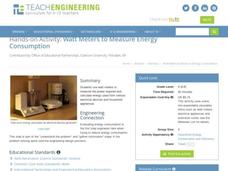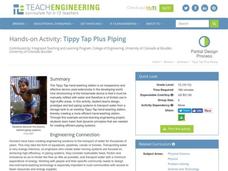Teach Engineering
How Effective is Your Sunscreen?
Protect skin from UV radiation! Groups design and conduct an experiment to test the effectiveness of UV safety products. The groups collect the data from the experiment and prepare a lab report. In the second day of the activity,...
Teach Engineering
Cell Membrane Color Sheet and Build a Cell Membrane
A cell of another color is still a cell. Pupils color a cell to identify its structures in the fourth segment of a seven-segment series. Groups work together to build a three-dimensional cell membrane segment, which is combined with...
Teach Engineering
Cell Membrane Structure and Function
Teach your class how to get out of a cell — or break in. The third installment in a seven-part series introduces the class to cell membranes and their functions. The lesson plan includes information to present to the class,...
Teach Engineering
Light Intensity Lab
Let there be light. The last installment of a seven-part series has pupils conduct an experiment on light attenuation through different numbers of transparency sheets. They then relate the results back to how X-rays measure bone density.
Teach Engineering
Connect the Dots: Isometric Drawing and Coded Plans
Individuals discover how to draw cubes on triangle-dot paper. They use cubes to build structures and draw corresponding isometric drawings on dot paper in the second lesson of the series of five. The activity also introduces the concept...
Teach Engineering
Let's Take a Spin: One-Axis Rotation
Investigate the effect of one-axis rotations on geometric figures. Scholars learn to use snap cubes and the right-hand rule to draw figures after rotations about the x-, y-, or z-axes. They try their hands at examples created by the...
Agriculture in the Classroom
Build it Better
If you think you can do better, feel free to give it a try. Pupils learn about the work on Temple Grandin and consider ways to improve animal handling facilities. They work in groups to build models to showcase their ideas.
Mascil Project
Design and Build Your Own Vacuum Cleaner, Hair Dryer or Toy Car
No vacuum cleaner? No problem, just build your own. Scholars apply knowledge of currents to build a model of either a vacuum clear, a hair dryer, or a toy car. While the class completes the activity, instructors consider gender...
Teach Engineering
Can You Take the Pressure?
Do not let the pressure get to you. The first lesson in a unit of 22 introduces the concept of air pressure. Using background knowledge, the resource gives teachers the information they need to discuss how people measure air pressure and...
Teach Engineering
Glue Sticks Bend and Twist
Stick this resource in the "Use" column. In the second installment of a six-part series, learners use glue sticks to demonstrate forces. Using glue sticks, instructors can demonstrate tension, compression, and torsion.
Teach Engineering
What a Drag!
Stop and drop what is in your hand! Pupils investigate how form effects drag in the 12th part of a 22-part unit on aviation. Groups create equally weighted objects and determine which one falls the fastest by collecting data.
Teach Engineering
Watt Meters to Measure Energy Consumption
It used watt amount of energy? This resource investigates the power usage of small household appliances. Using a watt meter, groups measure the actual wattage used by an appliance and then calculate the energy used daily.
Teach Engineering
Household Energy Audit
Do you have an energy hog in your home? Individuals pick at least one room at home to determine the amount of energy the appliances consume. Using that information, pupils fill out a worksheet to determine the cost of running each...
Teach Engineering
Energy Forms and States Demonstrations
Does a tennis ball have energy? What about a bowling ball? Demonstrate concepts of different forms of energy forms and states with a variety of objects. Using the equations for potential and kinetic energy, learners determine the amount...
Teach Engineering
Circuits
Don't know how to make the initial connection on electric circuits? This lesson provides the background to present the introductory vocabulary to learning about electric circuits. It is organized in a meaningful progression with an...
Teach Engineering
Solar Power
How much solar energy is available at my location? An engaging resource provides a presentation along with script to give the class background information on determining solar radiation. Pupils then work through a worksheet to estimate...
Teach Engineering
Organic Solar Energy and Berries
You can eat a solar cell? A unit on solar energy begins with a discussion about organic solar cells, followed by directions on how to build your own. After following the teacher's directions to build an anthocyanin dye-sensitized solar...
Teach Engineering
Tippy Tap Plus Piping
Getting water to a tap requires an understanding the fundamentals of fluid flow. Groups design, build, and test a piping system to get water from the source — a five gallon bucket — to a tippy tap. The objective is to be able to fill...
Teach Engineering
Energy Skate Park
Skate through a simulation on energy with an a activity that uses a computer simulation of a skater to reinforce the concept of conservation of energy. The resource guides pupils through scenarios using the computer simulation to see the...
Teach Engineering
Energy and the Pogo Stick
Let your class bounce to examine the concept elastic potential energy. Individuals bounce on a pogo stick in order to calculate its elastic potential energy. Groups then compare the elastic potential energy to the gravitational potential...
Teach Engineering
The Mighty Heart
Have your class follow the step-by-step directions in this resource to dissect a sheep heart and gain a better understanding of this amazing organ. Working in small groups, pupils look for specific parts of the heart during their...
Teach Engineering
What is a Nanometer?
Teams learn about the size of a nanometer by measuring objects and converting those measurements. A worksheet then tests the groups' abilities to use nanometers by having them determine the size of objects that are too small to measure.
Teach Engineering
Applications of Linear Functions
It's not so straightforward — lines can model a variety of applications. Pupils experience linear relationships within the context of science, including Hooke's and Ohm's Laws. Class members got a taste of motion and speed from the...
Teach Engineering
Nanotechnology and Cancer Treatments
Information on the biomedical use of nanotechnology, specifically in the detection and treatment of cancer, is the focus of a lesson that seems like it is out of a science fiction novel. Pupils learn about electrophoresis, which is used...

























